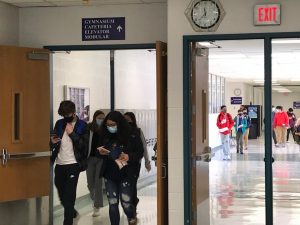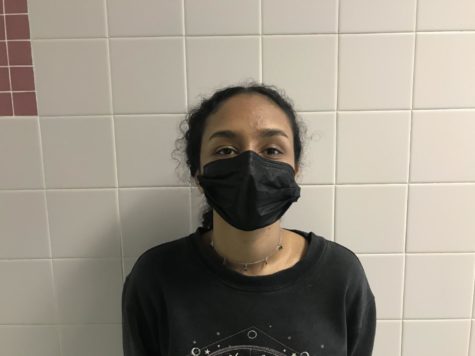Staying virtual amid hybrid learning
March 22, 2021
While Fairfax County has already begun to implement hybrid in-person learning, most students remain virtual. Since the number of students allowed in the school building is limited, students who initially chose virtual school could not switch to in-person learning later in the year.
“I actually kind of wanted to go back,” junior Ayham Elayan said. “At the beginning of the year, my family signed up for virtual [learning] but I didn’t know. So later I emailed to ask if I could go in person, but it was too late because they have a limit [of the number of students allowed in the building].”
To help students adjust to hybrid learning, teachers try to make classes interactive by encouraging online students to use their microphones to include in-person students in class discussions. However, since virtual learning has remained largely the same, the lack of face-to-face interaction during class continues to affect student academic performance.
“You can’t see anyone, and it can make you sad if you’re constantly seeing the computer screen,” Elayan said. “It’s definitely nice [that] people in person get to interact with others, even though there’s not that many people going.”
However, many decided to continue virtual learning because it became habitual. According to Ellevate Network the choice between two comfortable routines can often be the most anxiety-inducing, which can lead many to opt-out of transitioning all together.
“I think being online is just going to be a cycle of what we’re used to, which is also part of the reason I decided to stay home is that I was already so used to it,” junior Yukta Ramanan said. “We’ve been online for over a year now so I feel very accustomed to digital learning and want to keep it for the rest of the year.”
Some students have voiced their concerns about returning to school because of the virus. However, according to The New York Times, in the last month, there has been a steady decrease in average weekly COVID-19 cases in Virginia. Additionally, as forecasted by the Center of Disease Control, as of March 10, in the next four weeks the number of newly reported cases should decrease nationwide.
“I don’t want to put myself or my family at risk until we’re all really safe and vaccinated,” Ramanan said. “That was just the main concern. I would have returned to school in a heartbeat otherwise. I did [consider going back], but ultimately, your health comes first.”
Without the need to travel to school, those staying at home have more time to relax and are more likely to remain motivated, according to the University College London.
“I have a lot more time to spend with my family at home and my dog,” Ramanan said. “Although [online school] can seem overwhelming with all the media consumption, there’s a greater capacity to multitask or at least do things with less lag time.”



